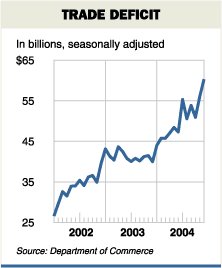Critique of Trade Surpluses and Deficits Criticism
Save this online in Del.icio.us. [?] Vote For this PostAn economics professor of mine took the time to critique my criticism of trade surpluses and deficits as being outdated. Here are his comments.
1) My prof agrees that trade surpluses and deficits being used as a measure of economic health is an outdated idea rooted in mercantilism. The basic premise of my argument as to why it no longer makes sense to gauge economic health by the balance of trade is accepted.
2) I said that judging the state of an economy by trade surpluses and deficits was morally reprehensible. The phrasing was a little cock-eyed, To clarify, if one accepts that trade deficits and surpluses can indicate how an economy is doing, with deficits being a sign of bad times and surpluses a sign of good times, then it follows that one country's economy is profiting at the expense of another. Thus the basis for such judgement, i.e. trade as a yardstick for economic performance, suggests a conception of trade as a zero-sum game where one can either win or lose.
3) I cited Ben Bernanke and co.'s book, Macroeconomics, which notes that the world has a net total deficit of $210 billion, due to differences and problems in accounting. This remains an argument showing that deficits and surpluses are lacking in value as indicators since the mathematical calculations might not be right. However, my prof pointed out something I hadn't noticed; $210 billion in the global scheme of things is chump change.


So the numbers are a little contradictory. Who cares?
Tags: balance of trade, economics, trade surpluses and deficits






3 Comments:
I am not sure I understand your point. First, you say "trade surpluses and deficits being used as a measure of economic health is an outdated idea rooted in mercantilism."
Then you show the two charts. Are you saying maybe there is something to this idea of indicating economic health?
The pictures of the US trade deficit and are not considered healthy!
I showed the two charts just as a sarcastic/simplistic way of showing the numbers don't mean anything (one has a line going up in blue, the other going down in red).
Mercantilism said a country is rich if it exports more than it imports. Mercantilism was based on colonialism, and bankrupted the colonies.
Arguably, it was a secondary/subtext cause of the Boston Tea Party, where British colonists angrily threw British goods into the sea.
Just lookit the pi'tures with lines headed different directions! It's crazytalk I tell ya!
Post a Comment
<< Home